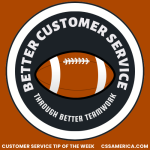After having worked on hundreds of projects over the years with thousands of thousands of individuals, some things become pretty clear. There are certain traits held by people who are great in customer service. Look at this list, and do a self-assessment. Which apply to you?
Positive and Patient
Do you convey positive messages to co-workers and customers, trying to focus on what you/they CAN DO rather than what can’t be done? Do you try to avoid interrupting others, try not to make them feel rushed?
Empathetic and Efficient
Do you convey an understanding of the other person and their situation, so they feel you care? Are you organized and proficient enough to be productive and responsive?
Relationships and Responsibility
Do you know how to get to know people, build trust, determine their likes/dislikes, and address their uniqueness? Are you reliable, dependable, and accountable for your duties and actions?
Knowledgeable and Kaizen-oriented
Do you know your processes, policies, products, and people? Do you try to improve yourself, your organization, your quality, your service experience?
Interested and Intentional
Do you focus on the other person, conveying your interest with your words, your expressions, your body language and tone of voice? Do you think about the purpose of what you say and how you say it – before you speak – considering why you’re asking the question or making the statement, considering the effect on the other person?
In considering these questions, how did you do? If you excel at any of these, pat yourself on the back! And if any of these “PERKI” attributes are not strengths or are areas that could be improved, make a game plan for your own professional development.
Chart a course for providing better customer service.
Signup for FREE Tips! Contact Us More Resources for You Visit Our Home Page
























